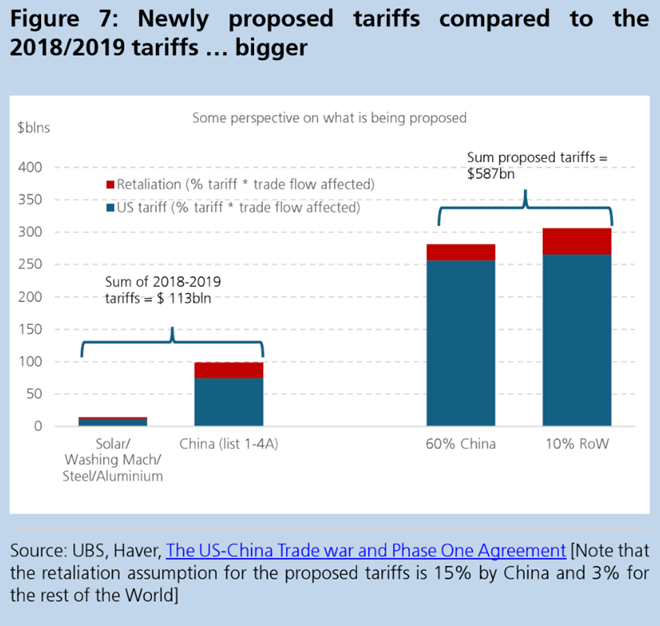
5 Steps to Prepare Your Business for Policy Changes in the Trump Administration
No CEO likes to admit how much government policy can make or break their business. While much of your business is up to your decisions, larger economic policy decisions like tariffs, tax breaks, geopolitical instability, and government investment can dramatically change your operating landscape. Your job as CEO is to steer your business through it all.
Each time an administration changes, it introduces change and potential uncertainty to the market. In 2025, Donald Trump will become the next President of the United States—but the question remains, will his second term be like his first? Or something new?
One key difference this time around is that Trump is coming to the White House with more experience and Congressional support. This means it’s much more likely the Republican agenda will move forward, and quickly. As we’ll discuss in this post, there are lots of potential upsides—and a few downsides, depending on your industry—to the new administration.
We spoke with two experts—2x CEO and coach Edward Hughes and political consultant Brent Buchanan—for their predictions on how the Trump Administration’s policies will impact businesses like yours, so you can prepare for what comes next. Here’s what we learned:
1. Advocate for Your Business on Key Policy Changes
A pillar of Republican tax policy for decades has been tax cuts for businesses, and this administration is no exception. In 2025, Congress must address the Tax Cuts and Jobs Act. The act changed deductions, expensing, and tax credit rules for businesses in 2017.
While Trump has promised additional tax cuts for certain groups, like tipped workers, Social Security recipients, and for overtime work, it’s uncertain what will make it in the final bill. “Having a Republican trifecta pretty much guarantees that most of the original provisions will stay,” says political consultant Brent Buchanan.
He notes that the Republican party has moved more toward working-class benefits, and that to stay relevant in their lobbying efforts, businesses must demonstrate how any policy changes benefit their employees, too. “It’s important for CEOs to be involved in the discussion as to why this act benefits them and their workers. They’ve got to show their representatives not just how it’s good for business, but how it can be good for all workers,” he said.
This approach to the new administration is one Buchanan recommends overall, whether you’re concerned about tax cuts or deregulation, it’s important to speak up in Washington—and be willing to make a deal.
2. Deregulation = More Opportunities for Growth
Another big priority for the incoming Trump administration is government efficiency. Trump appointed Elon Musk and Vivek Ramaswamy to run a presidential advisory commission designed to remove red tape.
“What matters for CEOs is not necessarily the entity itself, but that it demonstrates the mindset of the Trump administration,” says Buchanan. “They are going to drastically roll back the government’s involvement in business. That, combined with the Chevron opinion from the U.S. Supreme Court, which could impact the regulatory ability of every executive agency in the federal government, gives CEOs a rare opportunity to influence policy. Everything is on the table.”
Deregulation can unlock growth—but you have to be ready for it. “With deregulation comes growth, and we’ve already seen that optimism reflected in the stock market rally. As you think about the industries most likely to be deregulated, like finance, real estate, and energy, we’re going to see an acceleration in projects getting approved, creating a big growth opportunity,” says coach Edward Hughes.
3. Evaluate Your Manufacturing Practices Ahead of Tariffs
But Trump’s proposed policy changes aren’t just go, go, go. Trump has made it clear he plans to bring back some of the same tariffs he imposed in his first term, specifically targeting China, Mexico, and Canada. This may dramatically impact the automotive and technology industries—but regardless of your industry, evaluating your manufacturing practices is a must.

“The administration’s aggressive approach to tariffs must be viewed with caution: Tariffs are not free,” advises Hughes. CEOs may need to change their manufacturing approach, and we may see some reshoring efforts from international businesses, or net new manufacturing efforts in the United States. The tradeoff with that is it may cost more to manufacture in a new place—CEOs will have to evaluate every link in the supply chain to determine if they should change manufacturing locations or raise prices to offset costs.
“Industries that depend on imported goods, from consumer electronics to construction materials, will either pass costs to consumers or pivot to new suppliers, affecting profitability. CEOs should stay agile to navigate this complex terrain,” he adds.
4. Be Ready to Innovate
Taken together, these proposed policy changes mean high potential for businesses to unlock growth—if they’re ready for it.
“I think winners and losers are going to divide less on industry and more on innovation,” says Buchanan. “As things change and red tape is removed, organizations that are innovation-oriented will have more room to move around. You have to create your own opportunity.”
This is the time to think about your investments in your business. Do you have the people, processes, and products in place to grow? Hughes recommends workshopping several scenarios out with your leadership team to determine what puzzle pieces you need to put in place to be successful in the coming years. “Ask yourself and your team: What is going to be possible now, given what we know? How can we take advantage of these policy changes?”
Map out exactly what the impact looks like to your business and your industry. “Make a plan for growth,” says Hughes. “Rather than sitting back and waiting, you want to be proactive with this. New products and new investments take time to become successful, so you need to think about how your business will navigate this new policy environment.”
5. Hire a Coach to Help You Through Uncertainty
While we know big-picture agenda items for the Trump administration, there’s still a lot of uncertainty around the details: When will these tax cuts happen? How quickly will deregulation efforts go into effect? How will the market react?
If you want to take advantage of these policy changes, but aren’t sure where to start, our coaches have been there before. They’ve led successful companies through the last six administrations.
Whether you need someone to help map out a manufacturing plan to optimize against tariff changes or want to encourage a more agile, innovative culture for your organization, our coaches are here to help. Schedule a no-cost call today >
About CEO Coaching International
CEO Coaching International works with CEOs and their leadership teams to achieve extraordinary results quarter after quarter, year after year. Known globally for its success in coaching growth-focused entrepreneurs to meaningful exits, CEO Coaching International has coached more than 1,000 CEOs and entrepreneurs in more than 60 countries and 45 industries. The coaches at CEO Coaching International are former CEOs, presidents, or executives who have made BIG happen. The firm’s coaches have led double-digit sales and profit growth in businesses ranging in size from startups to over $10 billion, and many are founders that have led their companies through successful eight, nine, and ten-figure exits. Companies working with CEO Coaching International for two years or more have experienced an average EBITDA CAGR of 53.5% during their time as a client, more than three times the U.S. average, and a revenue CAGR of 26.2%, nearly twice the U.S. average.
Learn more about executive coaching | Meet our world-class coaches





